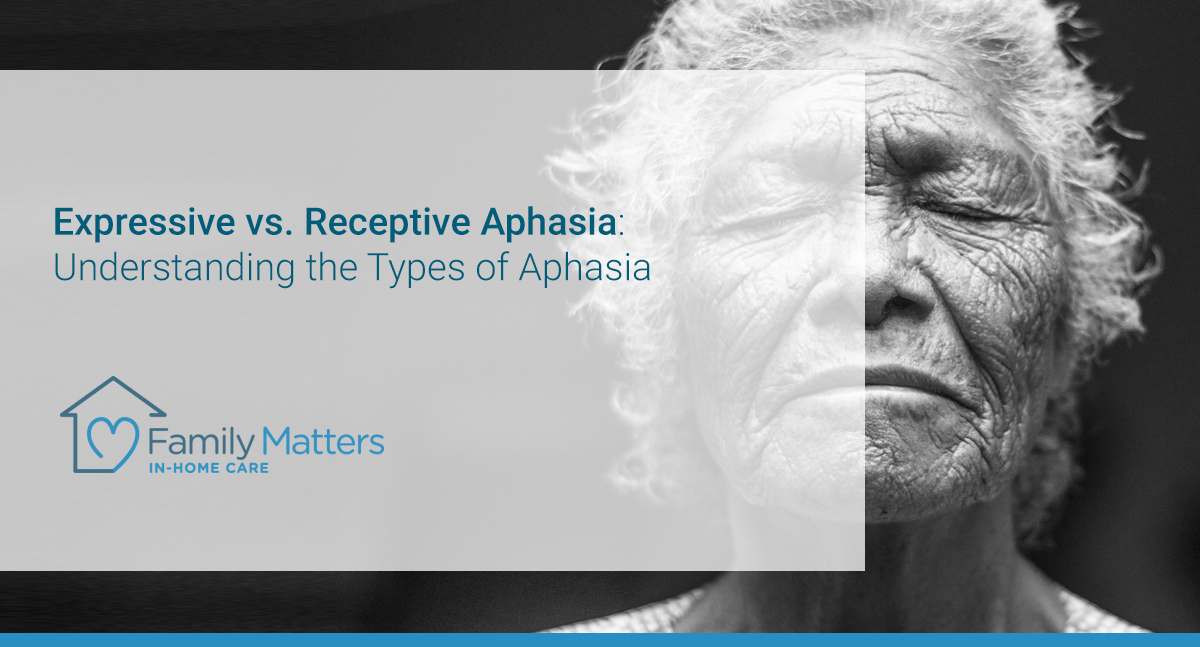
Expressive vs. Receptive Aphasia: Understanding the Types of Aphasia
Cognitive issues can occur for a variety of reasons as you age. However, strokes can alter thinking and cause difficulty with problem-solving and other cognitive tasks.
Strokes happen at many different intensities and last for varying periods of time. Various types of strokes can affect the brain in different ways, especially since the brain stores categorized types of information in specific places.
One common result of strokes is a condition known as aphasia, which a person may experience in several different ways depending on where strokes occur.
What Is Aphasia?
Aphasia is a cognitive disorder that specifically affects language and auditory processing. This condition results from strokes that occur in the left side of the brain, which is where language and speech are controlled.
Most people who experience aphasia retain the same mental clarity and alertness they had before their stroke. The primary difference between those with aphasia and those without is the individual’s ability to clearly communicate what they are thinking or feeling. Words can become jumbled or difficult to understand, even if the person is fully aware of what they are trying to communicate.
Different Types of Aphasia
There are several forms of aphasia that stroke survivors can develop. Though the different types can share symptoms, they can also vary greatly between individuals.
Broca’s Aphasia
Broca’s aphasia, or expressive aphasia, occurs when a stroke has injured the left hemisphere of the brain. When this area of the brain is damaged, it can affect a person’s ability to form sentences and communicate clearly.
A person with Broca’s aphasia sometimes leaves out articles like “the” or “is.” They may also mix up words that are similar to one another or words that are the opposite of each other, such as “boot” and “shoe” or “before” and “after.” Broca’s aphasia can also affect a person’s ability to understand what others are saying.
Wernicke’s Aphasia
Wernicke’s aphasia is also known as receptive aphasia. If someone is experiencing Wernicke’s aphasia, they may refer to an object, place, or person by a name that isn’t similar to its actual name. They may also struggle to build sentences that make sense, sometimes stringing together words that are completely unrelated to one another.
Global Aphasia
When a stroke specifically affects the left hemisphere of the brain in the front and/or back regions, it may result in global aphasia. This condition is a more generalized form of aphasia that can cause a variety of symptoms.
Overall, the most common communication issues caused by global aphasia are difficulty forming sentences, saying words, and understanding what others are saying.
Tips for Caring for Someone With Aphasia
If your loved one is experiencing aphasia, the first step to take is to determine whether they need more consistent care, such as a live-in caregiver or a move to an assisted living facility. Older adults with aphasia are usually not advised to live alone, as their cognitive and memory issues could lead to unsafe situations.
When spending time with your family member with aphasia, you can help support their language comprehension with these simple tips.
Keep Conversations Short
For those with aphasia, following the thread of conversations can be difficult, especially if they go on for more than a few minutes. This can lead to the individual becoming frustrated, which typically makes symptoms worse. When chatting with your loved one with aphasia, keep conversations short.
Establish Topics Early
Since people with aphasia struggle to keep track of the flow of conversation, it can be helpful to establish the topic you’re speaking about early so that the objective is very clear for your loved one.
Even if you’re simply chatting about the weather, make the topic clear from the beginning to avoid confusion. In general, you should avoid serious topics that could cause distress for those with aphasia unless completely necessary.
Ask Questions With Simple Answers
Many individuals with aphasia can still comprehend questions, but formulating a multi-word response can pose a challenge. If you need to ask your loved one a question, phrase it in a way that they can answer with a single word. “Yes” or “no” questions are best for people with aphasia.
Support Your Loved Ones Experiencing Aphasia
While aphasia can be a difficult adjustment after a stroke, your loved one can still enjoy the activities they love and spend time with family members. In order to support them, take the time to get to know their aphasia type and how to help them adapt.
If you or your family member is considering in-home care as part of a plan to age in place, contact Family Matters In-Home Care today for a free consultation. Our team is dedicated to supporting your family and helping older adults enjoy life in the comfort of their own home for as long as possible.
Some of the services offered by Family Matter In-Home Care include: Alzheimer’s & Dementia Care, Bed & Wheelchair Transfer Assistance, Companionship, Housekeeping & Meal Preparation, Personal Care, Recovery Care, and Transportation.
Serving the San Francisco Bay Area and Greater San Diego, Family Matter In-Home Care has offices throughout California including: Campbell, CA, Roseville, CA, San Marcos, CA, and San Mateo, CA.
